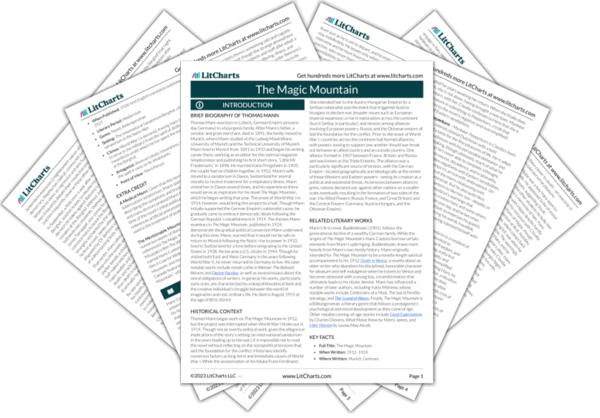Summary
Analysis
It’s difficult for Hans to tell how old the man is, but he seems to be in his thirties or forties. His clothes are loose and threadbare, but he has a “refined” expression on his face that lets Hans know he’s a gentleman. Joachim introduces the man as Herr Settembrini. The Italian man insists that the cousins sit back down and continues to lean against his cane. Recalling Hans’s earlier laughter, Settembrini asks, rather accusingly, if Hans’s journey went well and how his treatment is going. Hans is surprised to hear that the man doesn’t speak with an accent—it’s hard to tell that he’s a foreigner. He corrects Settembrini that he’s not a patient—in fact he’s perfectly healthy.
One way to read The Magic Mountain is as an allegory for Europe in the years leading up to World War I. In such a reading, Settembrini’s lack of an (Italian) accent might symbolize his neutrality, suggesting that his allegiance is with the greater good of (western) Europe as a whole and with the triumph of Western ideals in general rather than with nationalist, Italian ideals. Settembrini’s assumption that Hans is a patient could reveal something about how Hans appears to others, suggesting that he appears outwardly weak and passive.
Themes
Settembrini mockingly calls Hans “Odysseus” and commends his bravery for “descend[ing] into the depths” and being among the sick. When Hans explains that he’ll only be there for three weeks, Settembrini scoffs—weeks aren’t a unit of measurement people use here. Joachim explains that Settembrini is a literary man—he wrote the obituary for the poet Carducci and even had the pleasure of knowing him personally. Settembrini, upon learning that Hans is a shipbuilder, declares him a model for “a whole world of labor and practical genius.”
Settembrini’s description of Hans’s journey as a descent is ironic—Hans literally ascended the mountains to get to the Berghof. Settembrini’s clever remark gives readers (and Hans) a sense of his attitude toward the sanatorium and toward illness and suffering in general: there’s nothing noble about the situation. It’s comparable to hell, and being here won’t be enough on its own to inspire or educate Hans.
Themes
Settembrini goes off on a philosophical, humanist tangent in praise of Hans’s work, but it goes over Hans’s head. Hans apologizes for his slowness, explaining that he didn’t sleep well and has been out of sorts. He mentions his cigar tasting horrible. Settembrini calls Hans’s smoking habit a “vice,” explaining that it’s important to call things what they are. Settembrini rambles on about abstract ideas and theories. Eventually Joachim interjects, explaining that they must go to return to their “rest cure.” Settembrini says that he’s actually headed in the same direction, though, and so he joins Hans and Joachim on their walk home. He recites verses in Latin along the way, pausing only to ogle a young girl who crosses their path. Inwardly, Hans calls him a “windbag.”
Settembrini’s praise of Hans’s engineering work points to his humanist values, which is one of his character’s defining features. Humanism is a philosophical movement that came out of the Renaissance movement. A humanist values human progress and social potential over supernatural or divine forces like religion. That Settembrini’s praise for Hans’s work goes over Hans’s head ultimately emphasizes Hans’s youth and inexperience.
Themes
Settembrini changes the subject to rail against Director Behrens, ridiculing him for his large feet, his “summer cure”—an idea he claims to have invented—and his general idiocy. Hans enjoys Settembrini’s insults and gossip, and he praises him for his clever turns of phrase and general intelligence. Just then, Settembrini turns and spots Krokowski and Behrens behind them. Out of earshot, Settembrini mocks Krokowski’s self-assuredness and characteristic black clothing. He asks Hans what he thinks of the doctor, and Hans replies that he really hasn’t spoken with Krokowski all that much. Settembrini encourages him to form opinions quickly—it’s only natural.
It's unclear why Settembrini harbors such disdain for Behrens and Krokowski. As medical doctors, they’re technically in the business of improving and sustaining human life, which the humanist Settembrini should approve of. His mocking of Krokowski’s black clothing and air of self-assurance perhaps suggests that Settembrini despises the doctor(s) for their self-importance. As doctors, they effectively act as gatekeepers between life and death, and they become gods in a sense. Settembrini, with his humanist respect for democracy and human progress, would resent such a hierarchy—to him, it’s no different than religious authorities using the threat of damnation to subdue the masses.
Themes
Get the entire The Magic Mountain LitChart as a printable PDF.

Settembrini rambles all the way back to the sanatorium. After finally parting ways with him, Hans asks Joachim if Settembrini has much money. Joachim thinks probably not, but he at least has enough to stay at the sanatorium. He also explains that Settembrini comes from a long line of literary types.
Settembrini’s apparent lack of wealth—or, at least, his disinterest in outward displays of wealth—reveal more about his character. He seems to have little patience for decadence or self-indulgence, a trait that puts him at odds with the atmosphere of the Berghof, with its emphasis on rest and relaxation and its sumptuous meals.
Themes












